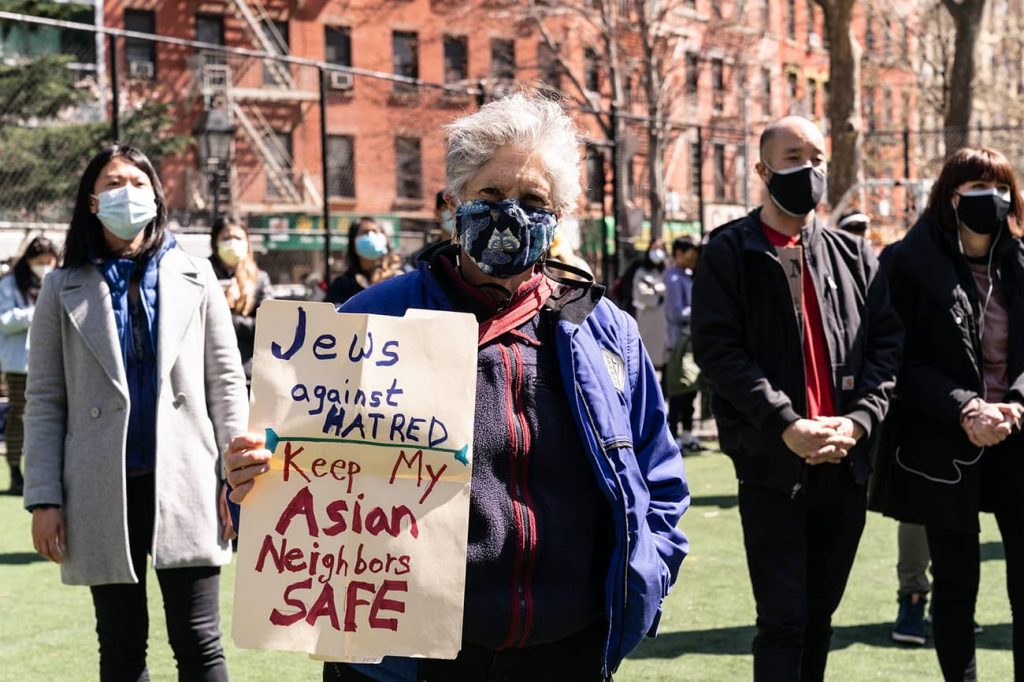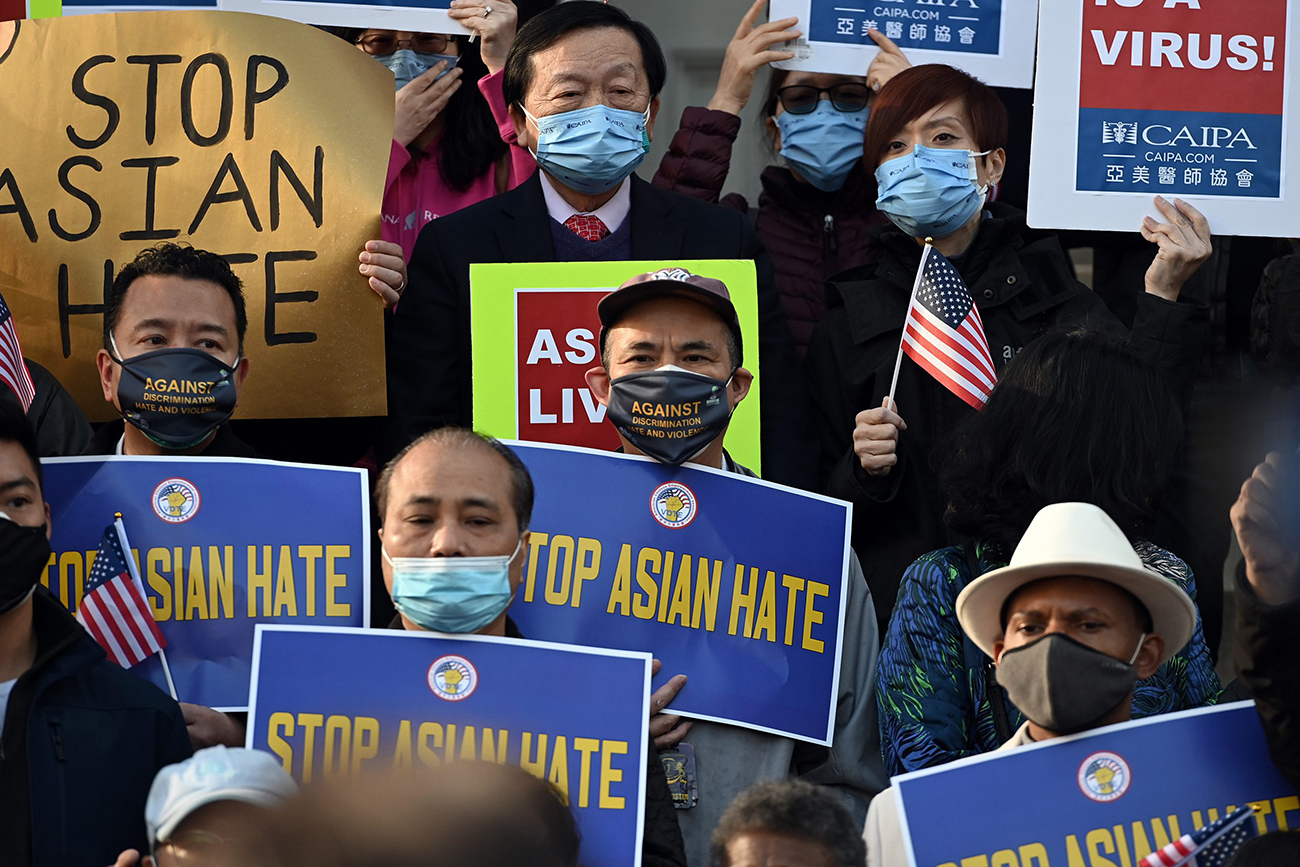In recent months, an alarming new trend in anti-Hindu activism in the United States has come to the fore as the latest manifestation of identity politics. The issue is complicated by internal politics as well as conflicting ideologies within the Indian American and South Asian communities in America. Yet blatant acts and hateful rhetoric targeting Hindu practitioners—or those identified as such, by their Indian names or ancestry—is something that the Jewish community can and should vociferously oppose.
I am proud to be associated with the American Jewish community and the American Jewish Committee (AJC), both of which have a long history of supporting civil rights in the US. Long preceding this pandemic, we have for decades demonstrated our support for Asian American communities. AJC was the first Jewish organization to support the efforts of Japanese Americans to receive a formal apology and reparations for their incarceration in US internment camps during WWII—an effort that succeeded with the passage of the Civil Liberties Act of 1988. AJC partnered with Chinese American and other Asian American groups in 2011 and 2012 to push for the passage of Senate and House resolutions expressing regret for the discriminatory Chinese Exclusion Laws of 1879 and 1904. We worked with Indian American groups in the wake of 9/11 to combat racism and discrimination and joined Chinese American partners in denouncing accusations of dual loyalty that have targeted Chinese American scholars and researchers in recent years—an accusation all too familiar to Jews.
Over the last two years, spiking numbers of events reflecting anti-Asian hate spurred AJC and others in the Jewish community to write op-eds, sign joint letters, and attend rallies condemning the violence. Additionally, AJC’s Asia Pacific Institute spearheaded support from over 50 Asian American national partner organizations for passage of the Jabara-Heyer No Hate Act. The legislation, which was signed into law in May 2021, enhances national reporting of hate crimes and improved security for targeted communities in the US.
Correspondingly, Asian American groups have also stood with us in our time of need, opposing antisemitism in its many forms and demonstrating solidarity. Following the Pittsburgh Tree of Life synagogue fatal shooting in 2018, over 100 Chinese American organizations expressed their support for the Jewish community, including participation in the “Show Up for Shabbat” campaign organized by AJC. Several Asian-American Pacific Islander (AAPI) organizations made statements in letters and social media relaying their condemnation and expressing unity, in the belief that an America that is dangerous for one minority is perilous for all.
Indian Americans have shown tremendous solidarity with the Jewish community at critical times when American Jews felt particularly vulnerable, such as when Jews have been targeted because of their perceived responsibility for the actions of Israel. Accompanying the surge of antisemitism during the Covid-19 pandemic, the fighting between Israel and Hamas in May 2021 sparked numerous physical assaults, vandalism, and hateful accusations against Jews across the country. Indian American friends and partner organizations stepped up to show their support by participating in demonstrations decrying antisemitism and posting expressions of solidarity in the social media. Such public displays of alliance are enormously important, conveying the sense that we are not standing alone in our demand for equality, respect, and dignity. Being joined by others, just as we have stood up for them, gives us confidence and strength.
The Jewish and Indian American communities have in the last decade found common ground over a number of issues such as US immigration reform, religious and ethnic pluralism, and minority rights. In recent years, there is a new issue of convergence—of great concern and reflecting a rift, actually, within the Indian American community, with broad repercussions in the wider public sphere. There is a growing anti-Hindu movement in the US that bears a strong resemblance to the anti-Israel Boycott, Divestment and Sanctions (BDS) movement, as it is manifested on college campuses and in local politics.

Anti-Hindu sentiments—similar to many BDS protests—often grow out of the assertion that members of an American ethnic or religious group are by virtue of their identity (or even simply by name or perceived ethnic ancestry), affiliated with or supportive of the foreign government from which their ethnicity and religion originates. Just as BDS associates American Jews with the policies of an Israeli government, so too anti-Hindu activists associate Indian Americans with India and its current ruling party, the BJP, and its allegedly nationalistic, Hindu-superiority agenda.
Just as Zionists are called racists and Islamophobes in some US circles, Hindu Indians are also called Islamophobes. Just as the true loyalty of American Jews is asserted to be to Israel, the loyalty of Indian American Hindus is asserted to be to India. The two communities—Indian Hindus and Jews—find themselves uniquely aligned in battles they face, primarily on college campuses, but growingly and alarmingly, in city councils. Seattle, Chicago, and Burlington are recent examples where anti-Hindu or BDS legislation, or both, were battled; more cities are sure to follow.
There is some overlap in the organizations aligned to support BDS and anti-Hindu activism. They are mostly progressive movements bound together by intersectionality and, thereby, support for all real and alleged victims of oppression, imperialism, racism, misogyny, discrimination, and authoritarianism that find unity in a call for justice. Additional groups have found a common vocabulary in their calls for a free Kashmir and free Palestine, both victims ostensibly under the boot of their respective Indian and Israeli oppressors. While a group like Stand with Kashmir, for example, may be focused on Kashmir, the organization’s fellow travelers may include anti-Zionist, pro-Palestinian organizations that support BDS or similarly accuse Israel of being an apartheid state, a settler occupier of stolen land, or worse still, accuse Jews of being contemporary Nazis with genocidal intent. The differences between these geographically, culturally, and historically distinct situations is lost on most supporters, who see only a black and white, good versus evil situation with little attention or interest in understanding the details. They are allies in what they perceive as equivalent if not identical situations of victims and oppressors.
The growing friendship between India and Israel, demonstrated most effectively by former Israeli Prime Minister Netanyahu and current Indian Prime Minister Modi, is attributed by critics of India’s BJP government and of Prime Minister Modi, to both leaders’ authoritarian tendencies, to their shared anti-democratic policies, but mostly, to both countries’ alleged hatred of Muslims and a growing sense of nationalism defined by religious identity.
It is important to note that the anti-Hindu movement also significantly differs from antisemitism, anti-Zionism, and BDS. It is critical not only of Indian politics and nationalism, but it also of the Hindu religion and philosophy itself. Some Indian American organizations that are combatting anti-Hindu hatred are accused of stifling academic freedom and of threatening legitimate criticism and debate on college campuses. As Jewish organizations show their support and solidarity in combatting anti-Hindu rhetoric and activism, we must also be careful not to be drawn into internecine battles within the American Indian community. But where the rights of individuals, minorities, civil liberties, and the right to express personal identity in the US are being attacked—where the very fact of their identity is used to target and tar individuals with gross accusations of disloyalty, partisanship, bias, and hatred—the Jewish community can and must stand up for our Hindu friends in protecting their rights, as we expect them to stand up for ours.
While the pandemic has wrought undeniable damage on a personal and national level, it is heartening to know that out of tragedy can come something positive. Based upon the foundation of decades of engagement between the Jewish and AAPI communities, now intensified by the past two years of crisis, I am certain that our relationship with various communities moving forward will be marked by even greater empathy, understanding, comradeship, alliance, and good works.

